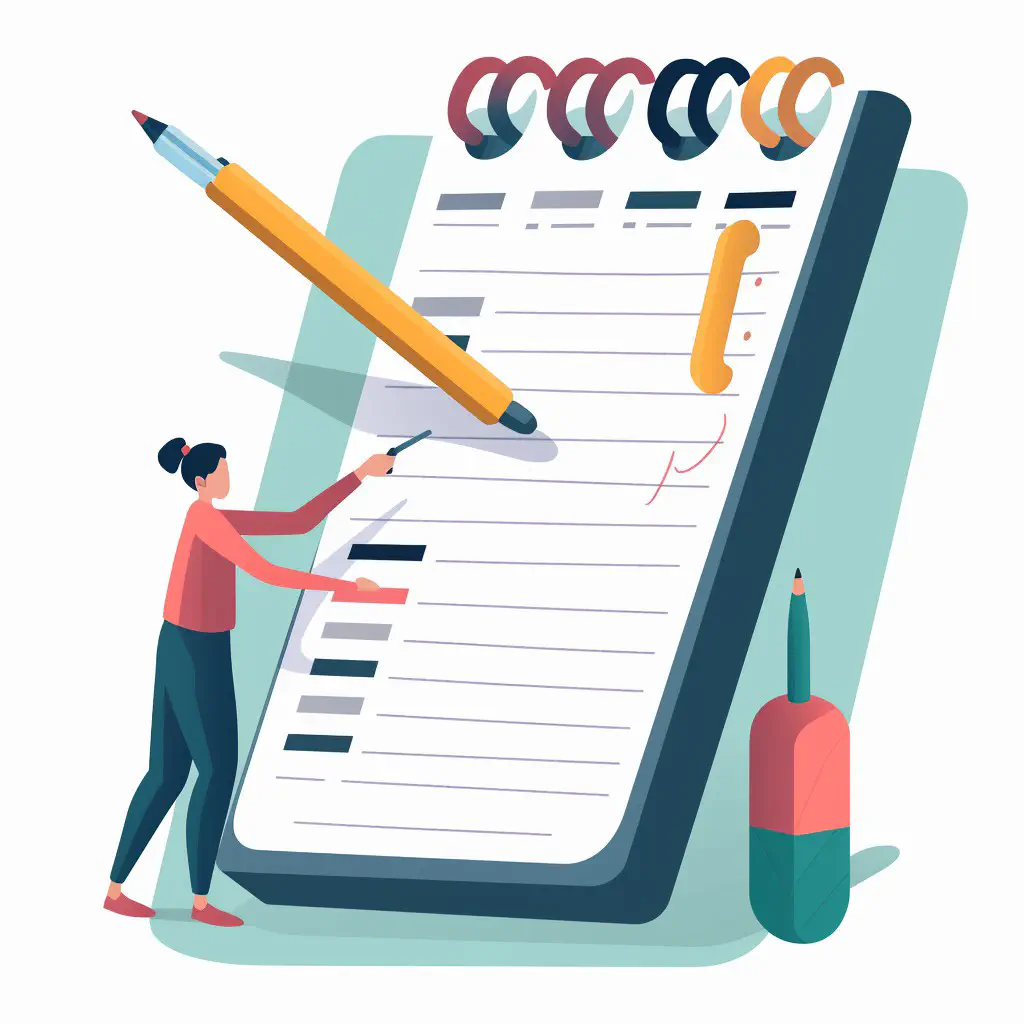
Description:
In this blog post, we’ll share 10 practical tips that will help you improve your attention to detail skills. These tips are designed to assist you in honing your focus and achieving better results, whether you’re dealing with complex projects or everyday tasks. From creating checklists to taking breaks, we’ve got you covered with tools and techniques you can start implementing right away.
Our tips will cover a wide range of strategies to improve your attention to detail skills, including:
- Developing a checklist to stay organized
- Eliminating distractions to stay focused
- Taking breaks to increase productivity
- Paying close attention to details
- Using timers to manage your time effectively
- Practicing mindfulness to reduce distractions
- Reviewing your work to catch errors
- Prioritizing tasks to stay on track
- Seeking feedback to improve your skills
- Continuously working to improve your abilities
Whether you’re a seasoned professional looking to improve your work output or someone looking to enhance your daily routine, these tools and techniques will help you optimize your approach and achieve better results. With practical advice and actionable tips, this post is a must-read for anyone looking to improve their attention to detail skills.
Table of Contents:
- Introduction
- Tip 1: Create a Checklist
- Tip 2: Eliminate Distractions
- Tip 3: Take Breaks
- Tip 4: Pay Attention to the Details
- Tip 5: Use a Timer
- Tip 6: Practice Mindfulness
- Tip 7: Review Your Work
- Tip 8: Prioritize Your Tasks
- Tip 9: Get Feedback
- Tip 10: Continuously Improve
- Conclusion
Introduction:
Attention to detail is a highly sought-after skill in today’s fast-paced world, where errors can lead to costly mistakes. This skill is especially crucial in the workplace, where it can make or break a project’s success. While some people seem to naturally have an eye for detail, anyone can improve this skill with practice and determination.
In this blog post, we will provide you with ten practical tips that will help you improve your attention to detail skills. We will cover everything from creating checklists to eliminating distractions, taking breaks, and paying attention to the details. By following these tips, you can hone your focus, reduce errors, and achieve better results in all areas of your life. So, let’s get started!
Tip 1: Create a Checklist:
Creating a checklist may seem simple, but it is an effective way to improve your attention to detail. A checklist ensures that you don’t miss any important steps or details, and it also helps you to stay organized and focused. Here are some tips for creating an effective checklist:
- Identify all the tasks involved: Make a list of all the tasks that need to be completed in a specific order or sequence. This may include smaller tasks, subtasks, or even individual steps.
- Be specific: Make sure that each task or step is as specific as possible. For example, instead of writing “Complete paperwork,” write “Fill out Form A and submit to Supervisor B by 3:00 pm.”
- Use bullet points: Instead of writing out a paragraph, use bullet points to make the list easier to read and follow.
- Include deadlines: If there are specific deadlines, make sure to include them in the checklist so you don’t miss them.
- Review and revise: Before starting the task, review the checklist to make sure it includes all the necessary tasks and steps. As you complete the task, revise the checklist as necessary to ensure that you’ve covered everything.
A checklist is a straightforward yet essential tool that can help you improve your attention to detail skills. By using a checklist, you can stay organized, focused, and ensure that you don’t miss any important details.
Tip 2: Eliminate Distractions:
Distractions can derail your attention and keep you from staying focused on the task at hand. Here are some ways to eliminate distractions and improve your attention to detail:
-
Turn off your phone: Your phone is one of the biggest sources of distraction. Turn it off or put it on silent mode.
-
Close unnecessary tabs: Keep only the tabs that are relevant to the task you’re working on.
-
Block social media sites: There are browser extensions available that can block social media sites, which can be a major distraction.
“Clutter is not just physical stuff. It’s old ideas, toxic relationships, and bad habits. Clutter is anything that does not support your better self.” - Eleanor Brown
-
Declutter your workspace: A cluttered workspace can be distracting. Clean up your workspace and keep only what you need.
-
Use noise-cancelling headphones: If you’re working in a noisy environment, noise-cancelling headphones can help you focus on your work.
Eliminating distractions requires discipline and commitment. But by doing so, you’ll be able to improve your attention to detail and complete tasks more efficiently.
Tip 3: Take Breaks:
Taking breaks is an important part of improving your attention to detail skills. It may seem counterintuitive, but taking a break can actually increase your productivity and focus. Here are some tips on how to take effective breaks:
- Plan your breaks: Schedule regular breaks throughout your day to ensure you take them. Use them as a reward for completing a task or to recharge your energy levels.
- Change your scenery: Whenever possible, take your break in a different location to avoid monotony and get some fresh air.
- Do something you enjoy: Use your break to do something that relaxes you, such as reading a book, taking a short walk, or chatting with a colleague.
- Avoid screens: Give your eyes and brain a rest by avoiding screens during your break. This includes your phone, computer, or TV.
- Stay hydrated: Don’t forget to drink water during your break to keep your body hydrated and your mind alert.
Remember, taking regular breaks is essential for maintaining your focus and energy levels throughout the day.
Tip 4: Pay Attention to the Details:
When it comes to improving your attention to detail skills, paying attention to the details is the most critical step. It’s essential to take your time and examine all aspects of a task to look for ways to improve it. Here are some tips to help you pay more attention to the details:
-
Look at the task from different angles: Take a step back and examine the task from different perspectives. This technique can help you identify areas where you need to pay more attention to the details.
-
Break down the task into smaller parts: Breaking down a task into smaller parts can help you focus on each detail and ensure that nothing is missed.
-
Use visual aids: Visual aids can help you see the task more clearly and notice details that you may have missed before. Use graphs, charts, and diagrams to help you analyze and understand the task.
-
Ask questions: Don’t be afraid to ask questions if you’re unsure about something. Asking questions can help you clarify the task and understand what’s expected of you.
-
Double-check your work: Before submitting or presenting your work, be sure to double-check it for any errors or omissions. This step can help you identify areas where you need to pay more attention to the details.
Remember, paying attention to the details requires patience and practice. The more you practice, the better you’ll become at noticing details and improving the quality of your work.
Tip 5: Use a Timer:
Using a timer can help you stay focused on a task and improve your time-management skills. There are several ways to use a timer to improve your attention to detail:
-
Set a specific amount of time for each task: Break down your tasks into smaller chunks and set a specific amount of time for each one. This will help you stay focused and avoid getting overwhelmed.
-
Use the Pomodoro Technique: The Pomodoro Technique is a time-management method that involves working for 25 minutes and then taking a 5-minute break. After four cycles, take a longer break. This technique can help you stay focused and avoid burnout.
-
Use a digital timer: There are several digital timers available that can help you stay focused on a task. You can set the timer to go off after a specific amount of time, and some timers even have visual cues to help you stay on track.
-
Use a physical timer: Using a physical timer, such as an egg timer or a kitchen timer, can also help you stay focused on a task. The ticking sound can act as a reminder to stay on track, and the timer will let you know when it’s time to move on to the next task.
Remember, the goal of using a timer is not to rush through a task, but rather to stay focused and avoid getting sidetracked. By using a timer, you can improve your attention to detail skills and become more efficient in completing your tasks.
Tip 6: Practice Mindfulness:
Practicing mindfulness can improve your attention to detail skills by helping you focus and reduce distractions. Here are some ways to incorporate mindfulness into your daily routine:
-
Meditation: Spend a few minutes every day practicing meditation. Sit in a quiet place and focus on your breath, bringing your attention back to your breath every time your mind wanders.
-
Breathing exercises: Take a few deep breaths and focus your attention on the sensation of the air entering and leaving your body.
-
Stretching: Incorporate stretching into your daily routine. Focus on the sensation of your muscles stretching and releasing tension.
-
Eat mindfully: Pay attention to the smells, tastes, and textures of the food you eat. Chew slowly and savor each bite.
-
Practice gratitude: Take a moment to appreciate the things you have and express gratitude for them. This can help you stay focused on the present and reduce stress.
By incorporating mindfulness into your daily routine, you can improve your attention to detail skills and achieve better results in all aspects of your life.
Tip 7: Review your Work:
Once you’ve completed a task, it’s crucial to take the time to review your work. Here are some things to keep in mind:
Check for Errors and Omissions:
When reviewing your work, check for any errors or omissions that need to be corrected. Look for spelling or grammar mistakes, missing information, or anything else that could affect the outcome of your task.
Verify Accuracy:
Make sure that all the information you’ve provided is accurate. Double-check numbers, figures, and other data to ensure that they’re correct.
Assess Quality:
Evaluate the quality of your work and determine if there are any areas where you could improve. Ask yourself if the work you’ve done meets the standards you set for yourself or your organization.
Consider Feedback:
If you’ve received feedback from others, take it into consideration when reviewing your work. Use the feedback to identify areas where you need to improve and make the necessary changes.
Use a Checklist:
Having a checklist can help you ensure that you’ve reviewed your work thoroughly. Make a list of all the things you need to check, and tick them off as you go.
By taking the time to review your work, you can catch any mistakes, omissions, or inaccuracies and ensure that you’ve done your best.
Tip 8: Prioritize Your Tasks:
When it comes to improving your attention to detail skills, prioritizing your tasks is a crucial step. Here’s how you can do it:
Make a List:
Start by making a list of all the tasks you need to complete. This could be anything from a single project to your daily to-do list.
Categorize Your Tasks:
Next, categorize your tasks based on their level of importance. This will help you identify which tasks you should focus on first.
Use a Priority Matrix:
A priority matrix can help you visually prioritize your tasks. The matrix consists of four quadrants:
| Quadrant | Description |
|---|---|
| Urgent and important | Tasks that require immediate attention |
| Important but not urgent | Tasks that are important but can be scheduled for later |
| Urgent but not important | Tasks that are urgent but don’t carry much weight |
| Not urgent and not important | Tasks that are neither urgent nor important |
By using a priority matrix, you can prioritize your tasks effectively and make sure that you’re focusing on the tasks that matter most.
Be Realistic:
Don’t overload yourself with too many tasks. Be realistic about what you can accomplish in a day. If you’re constantly feeling overwhelmed and stressed, you won’t be able to focus on the details.
Re-prioritize as Needed:
Finally, remember to re-prioritize your tasks as needed. Circumstances can change, and new tasks may arise. Keeping your priorities up-to-date will ensure that you’re always focusing on the right things.
Tip 9: Get Feedback:
Getting feedback from others can give you an outside perspective on your work and help you identify areas where you need to improve your attention to detail skills. Here are some ways you can get feedback:
- Ask your colleagues: Colleagues who are experienced in the same field can provide valuable feedback on your work. They can point out where you may have missed some vital details and suggest ways to improve.
- Ask your supervisor: Your supervisor can provide feedback on your work and help you develop your attention to detail skills. They can be a valuable resource to learn from as they have more experience and expertise in the field.
- Join a peer group: Joining a peer group can help you get feedback from individuals who are going through similar challenges as you. It can also provide you with an opportunity to learn from others and share your own knowledge and expertise.
- Use online tools: There are various online tools that allow you to get feedback on your work, such as Grammarly, Hemingway Editor, and ProWritingAid. These tools can help you improve both your writing skills and your attention to detail skills.
Remember that feedback is essential to improving your skills, but not all feedback is created equal. Be open to constructive feedback that acknowledges areas where you can improve while ignoring negative comments that do not provide helpful insights.
Tip 10: Continuously Improve:
Improving your attention to detail skills is an ongoing process. Here are some more tips to help you continuously improve your skills:
- Get organized: Keeping your workspace clean and organized can help you stay focused and reduce distractions. Make sure you have all the necessary tools and materials before starting a task.
- Practice active listening: Pay attention to what others are saying and ask questions to clarify any misunderstandings. This will help you improve your communication skills and avoid making mistakes.
- Attend training and workshops: Take advantage of any training or workshops offered by your employer or industry associations. This will help you stay up-to-date with the latest trends and techniques.
- Read books and articles: Reading books and articles on topics related to your work can help you gain new insights and improve your skills. Make time to read regularly and apply what you learn to your work.
- Set goals: Setting specific, measurable, and achievable goals can help you stay motivated and track your progress. Make sure your goals are aligned with your overall career objectives.
- Ask for mentorship: If you know someone who has excellent attention to detail skills, consider asking them to mentor you. They can provide you with valuable feedback and advice on how to improve your skills.
Remember, improving your attention to detail skills is not something you can achieve overnight. It takes patience, commitment, and persistence. But with the right mindset and approach, you can master this essential skill and excel in your personal and professional life.
Conclusion:
In conclusion, attention to detail is a crucial skill that can significantly improve your productivity and efficiency in both your personal and professional life. By following these ten practical tips, including creating a checklist, eliminating distractions, taking breaks, paying attention to details, using a timer, practicing mindfulness, reviewing your work, prioritizing tasks, getting feedback, and continuously improving, you can hone your focus and achieve better results in completing your tasks. Remember, improving your attention to detail skills is an ongoing process that requires consistent practice and effort. So, strive to do better every day and continuously look for ways to improve your skills.
As Vince Lombardi said, “Perfection is not attainable, but if we chase perfection, we can catch excellence.” By chasing perfection through improving your attention to detail skills, you can catch excellence in all aspects of your life. So, start applying these practical tips today and see the positive impact on your productivity and efficiency.

